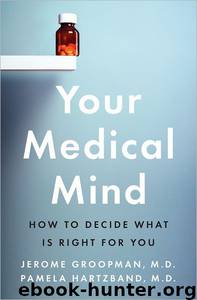Your Medical Mind: How to Decide What Is Right for You by Jerome Groopman & Pamela Hartzband & Md Pamela

Author:Jerome Groopman & Pamela Hartzband & Md Pamela [Groopman, Jerome & Hartzband, Pamela & Pamela, Md]
Language: eng
Format: epub
Tags: Non-fiction, Health & Fitness
ISBN: 9781101547823
Google: NmCP-QAJrhkC
Barnesnoble:
Goodreads: 11799411
Publisher: Penguin
Published: 2011-09-01T00:00:00+00:00
After Mary’s death, Deidre spent much time reflecting on what had happened. We asked her if another loved one became seriously ill, would she handle things any differently from the way things had gone with her mother? “I want to shout out and say, ‘Yes!’” Deidre replied. “We thought we had had the conversation, but we hadn’t. We thought we agreed on no heroics—that everything would be clear. But it wasn’t. It was such a struggle for me, and looking back, I feel guilty that I never had an open conversation with Mom about palliative care, instead of one more procedure to try and poke a hole in her liver, and drain it and get rid of the infection. My biggest struggle personally is that that kind of conversation was never held.”
A study published in 2010 in the New England Journal of Medicine evaluated the potential benefit of early introduction of what is called “palliative care.” This involved “specific attention” to assessing “physical and psychosocial symptoms, establishing goals of care, assisting with decision making regarding treatment, and coordinating care on the basis of the individual needs of the patient.” All these patients had newly diagnosed metastatic lung cancer. They were treated at Massachusetts General Hospital but weren’t hospitalized. Rather, they were living at home. The patients were randomly assigned either to receive usual care or to receive usual care and palliative care. Those assigned to the palliative care group met at least monthly with specialized physicians or nurses. The results of the research showed that patients receiving palliative care chose less aggressive therapies but nonetheless lived longer, some two to three months, and had somewhat better quality of life. In the editorial accompanying the article, Drs. Amy Kelley and Diane Meier of Mount Sinai Medical Center in New York noted the “salutary effect” of additional time with and attention from physicians, nurses, and other health care professionals.
The need to provide more individual attention and spend more time with very sick patients will collide with a modern medical system that increasingly rewards “efficiency.” Prominent health policy planners, and even some physicians, envision the hospital and its clinic as a factory and assert that medical care should be delivered in an industrialized fashion. Visits with patients are shaved down to a few minutes; conversations are structured to meet standardized protocols and quality measures. But the difficult and often changing decisions patients make about what and how much more to do in the midst of a life-threatening condition are not “products” that “efficiently” roll off an assembly line. Guiding a patient and her family as she nears the end of her life is neither an easy nor an efficient process. It takes time and effort because it is not direct, not linear; it involves much back-and-forth discussion, often without coming to a decision or, after deciding, reversing that choice and then later changing choices again. This new medical system might be more efficient in delivering certain types of care, but it often ends up not caring for the patient.
Download
This site does not store any files on its server. We only index and link to content provided by other sites. Please contact the content providers to delete copyright contents if any and email us, we'll remove relevant links or contents immediately.
When Breath Becomes Air by Paul Kalanithi(7294)
Why We Sleep: Unlocking the Power of Sleep and Dreams by Matthew Walker(5680)
Paper Towns by Green John(4190)
The Immortal Life of Henrietta Lacks by Rebecca Skloot(3843)
The Sports Rules Book by Human Kinetics(3612)
Dynamic Alignment Through Imagery by Eric Franklin(3511)
ACSM's Complete Guide to Fitness & Health by ACSM(3481)
Kaplan MCAT Organic Chemistry Review: Created for MCAT 2015 (Kaplan Test Prep) by Kaplan(3437)
Introduction to Kinesiology by Shirl J. Hoffman(3315)
Livewired by David Eagleman(3153)
The River of Consciousness by Oliver Sacks(3008)
Alchemy and Alchemists by C. J. S. Thompson(2923)
The Death of the Heart by Elizabeth Bowen(2920)
Descartes' Error by Antonio Damasio(2757)
Bad Pharma by Ben Goldacre(2744)
The Gene: An Intimate History by Siddhartha Mukherjee(2510)
Kaplan MCAT Behavioral Sciences Review: Created for MCAT 2015 (Kaplan Test Prep) by Kaplan(2501)
The Fate of Rome: Climate, Disease, and the End of an Empire (The Princeton History of the Ancient World) by Kyle Harper(2452)
The Emperor of All Maladies: A Biography of Cancer by Siddhartha Mukherjee(2446)
